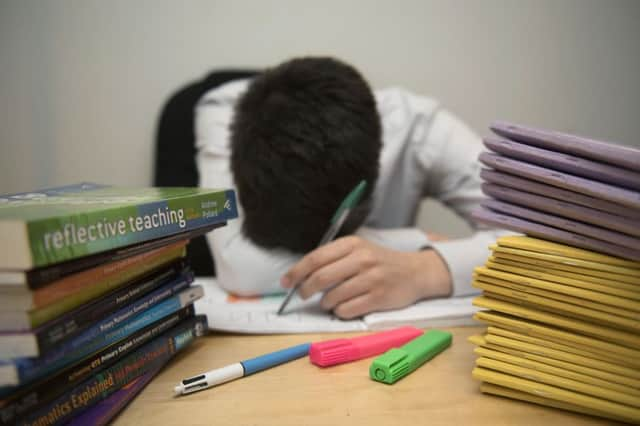A fifth of parents help fund school


In some cases, hard-pressed mothers and fathers have been asked to contribute more than £100 a year.
The findings, in a poll conducted by the NASUWT teaching union, also show that many families are handing over money to pay for visits such as trips to museums or the theatre, and some are being asked to cover the costs of activities required as part of an exam course.
Advertisement
Hide AdAdvertisement
Hide AdNASUWT general secretary Chris Keates argued that parents are facing escalating costs linked to their child’s education.
The findings have been released amid concerns from school leaders and teachers about growing funding pressures in England’s state schools.
Ministers have argued that schools funding is at record levels.
In total, 18 per cent of parents said they had been asked to complete a standing order or direct debit for a regular donation. Of those, around 23 per cent said the school had said the money would go towards the school budget, more than half (51 per cent) had been told it was to enhance resources, a further 18 per cent said they had been told it was to improve extra-curricular activities and nine per cent said the money was going to a specific school project.
Advertisement
Hide AdAdvertisement
Hide AdThe parents polled were asked how much the donation had cost them weekly, monthly or yearly.
Of those who gave the figure in a yearly form, 61 per cent said that they had donated £10 to £50 a year, while around a fifth said the contributions cost £101 or more a year.
The survey, published as the NASUWT meets for its annual conference in Manchester, also found that among parents who have not been asked to make a regular contribution, 13 per cent said that they have still made a financial donation because the school expects them to, while 16 per cent said they gave voluntarily. The rest had not made a donation.
The government has previously said that schools must make it clear to parents that they are not obliged to make contributions.
Advertisement
Hide AdAdvertisement
Hide AdOverall, around 96 per cent of those polled by the union said that they had paid for a visit related to a particular topic or subject their child was studying, while 23 per cent had paid for an activity required as part of an exam course or qualification.
Just over a third (38 per cent) said they had made a contribution for their child to take part in after-school activities, lessons or clubs outside formal childcare.
Ms Keates warned that “substantial financial pressures” are now being placed on parents and carers.
“The costs of attending some schools are now acting as a barrier to parents accessing their school of choice for their children and are effectively a covert form of selection,” she said.
Advertisement
Hide AdAdvertisement
Hide Ad“The NASUWT is clear that access to education must not be based on parents’ ability to pay.”
The survey saw almost 4,000 parents being questioned during December and January. The Association of Teachers and Lecturers, GMB, National Association of Head Teachers, the National Union of Teachers, Unison and Unite have previously claimed that 98 per cent of schools face a real terms reduction in funding for every pupil, with an average loss of £339 per primary youngster and £477 for secondary students.
But, speaking earlier this year, a Department for Education spokesman said: “School funding is at its highest level on record and will be over £40bn in 2016-17.”